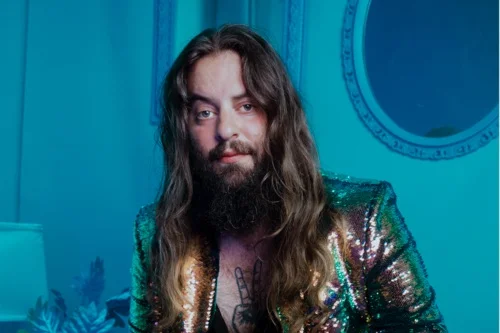Jeremiah Fraites//The Lumineers
“The amount of emotional weight that 2020 offered was like quicksand. It was not a spark to create a bonfire. It was like an anaconda wrapping itself around your body and pulling you down slowly.”
Jeremiah Fraites of The Lumineers wrote most of his new solo album Piano Piano pre-pandemic, but like most songwriters, he says that the past year has wreaked havoc on artists’ creative process.
Jeremiah Fraites of The Lumineers can write almost anywhere. He can write in a silent room sitting at the piano, and he can write in a packed, loud green room sitting at the piano. He’s even written while standing in front of the piano.
And fortunately for Fraites, he wrote most of his new instrumental solo album Piano Piano before March 2020. Some music on the album had its genesis over a decade ago: Fraites keeps hundreds of voice memos of song ideas, riffs, and melodies, and he returns to them at the beginning of each project. It’s a laborious and taxing project. But this easy access allows him to mix and match those ideas, riffs, and. melodies to turn them into fully formed songs. In fact, a riff you hear on “Nearsighted” is the same riff—literally—that he recorded 13 years ago after a night at the pub.
But while Fraites doesn’t rely on a specific ritual for his songwriting process, like most songwriters I’ve talked to, the past year has not been a boon for creativity. “Last year was not a good headspace to write from. All that isolation was not good. There was, and is, an underlying element of fearfulness that’s bad for the creative spirit,” he says.
Fraites’s new album Piano Piano is out now. Read our interview after the video for “Maggie.”
With no touring and large expanses of time on your hands because of it, have you found that you write better with deadlnes or with those large expanses of time?
A
There’s a sweet spot. Too much time allows for too much second guessing and not enough fire under you to get moving. But too little time can make you feel rushed. If I had to choose, I’d pick a little less time instead of a little more time. I’ve found that having a child [Ed note: Fraites’s son is 2 1/2 years old], besides making me forget what I even used to do before him, makes that free time so much more precious. This is especially true when it comes to recording: that takes twice as much good fortune because I also need silence.
With Piano Piano, there was no time limit, but I still gave myself a deadline of about 4 months. That was helpful.
There seems to be this idea that all this downtime is fantastic for artists’ creativity. But the vast majority of songwriters have told me that the heavy emotional toll of the past year has made it difficult to write. Many have used the word “blocked.” In general, is it difficult for you to write under any kind of heavy emotional weight?
A
I didn’t really have to force myself to write this record, but there was also the added benefit that some of these songs had really old seeds. “Nearsighted,” for example, got started 13 years ago. The guitar you hear on that song is the one I recorded in England many years ago. I came home one late night after being at a pub and recorded it on a laptop. What you hear on “Nearsighted” is that same take from the laptop.
I did write some new ideas in 2020, but if I had to write a whole album, it would’ve been impossible. Most of the album was already written. I just needed to add some pieces here and there. Or I might have had three separate song ideas, so I’d go through hundreds of stored voice memos and fit them in those songs like puzzle pieces. It was fun connecting all those ideas.
A little bit of friction is important in the creative process. I just turned 35, and when I was in my late teens I really bought into the idea of the “tormented artist.” I always thought that you had to be that way in order to create, that you had to be depressed and you had to take drugs. I just celebrated 5 years of sobriety, and I’m a father and a husband. I’m happier now than I’ve ever been. I’ve never been more creative. I used to worry that if I found some success or some measure of happiness, I’d lose my creative edge and not be as productive. But that’s not true at all.
I do think that last year was not a good headspace to write from. All that isolation was not good. It’s almost like a form of torture. There was, and is, an underlying element of fearfulness that’s bad for the creative spirit.
Independent of the pandemic and the political climate, emotional weight just makes it difficult to write. If you’re too low, it’s hard to summon that spirit, isn’t it?
A
The amount of emotional weight that 2020 offered was like quicksand. It was not a spark to create a bonfire. It was like an anaconda wrapping itself around your body and pulling you down slowly.
You mentioned “second guessing” yourself earlier. Is there a certain moment in your creative process when you stop and realize that you’re doing second guessing and that you need to move on?
A
There’s a song called “Maggie” on the new album and another one called “Possessed” where I told myself I really love the way that sounds, but then after a week and the microphones are up, it’s easy to get caught up in the notion that more is better. Like one more melodic line on the piano or just one more string. But Wes (Schultz, Fraites’s bandmate in The Lumineers) and I are good at trimming the fat from our music, so when I started working on my solo stuff, that element was already pretty fine tuned. I’ve learned that just because I like something doesn’t mean I should keep it.
It’s like if you’re eating a scoop of good vanilla ice cream—something arguably simple—and decide to throw some chocolate or some nuts on it. You’re gonna like it, but is it what you need long term? That long-term vision is something I think about all the time. I love the idea of, say, crafting a song where you don’t even need to add drums to a song because the drums are implied. With “Possessed,” there was something I wanted to add to the last chorus. I added it and loved it, but then I thought how much I loved constructing songs where the brain fills in the gaps naturally. I get off on conjuring those ideas and leaving those intentional spaces. I think our brain can fill in, say, the drums without the drums actually being there.
“I love the idea of crafting a song where you don’t even need to add drums to a song because the drums are implied. I get off on conjuring those ideas and leaving those intentional spaces. I think our brain can fill in, say, the drums without the drums actually being there.”
It sounds like voice memos are an important part of your process. How often do you go back to them?
A
Every time I start a new project. I start way back at the beginning and sift through hundreds of voice memos. That might take me two or three weeks. It’s very taxing to listen to all of those ideas because a lot of them are unusable, so I’ll sit down with a cup or two of strong coffee and go through them. Some of them are so old that I’ve forgotten how to play them, which means I have to relearn them.
Something I think I’ve gotten good at over the years is being able to recognize a good idea and pairing it with something else I’ve done. I’ll put a file name on that original idea. Then weeks, months, maybe even years later I’ll be listening to voice memos, then a lightbulb goes off and I’ll know that I need to pair that new idea with the old one, and I’ll know where to find it.
Do you have any specific ritual to your writing process?
A
I’m from the Steve Martin school: he has a banjo in every room of the house, and if I could I’d have a guitar or piano in every room. I don’t have a specific routine. Some of my best ideas have come in quiet rooms, others have come in noisy green rooms. I wrote “Possessed” after watching cartoons with my son. We were winding down at night, and I had a guitar in my hand. I started playing it without even knowing what I was doing, then I started writing without even realizing it. I put him to bed and ran to the piano, where I transposed the song from guitar to piano.
As long as I have an instrument, I can pretty much do it anywhere. But I’ve also had a lot of ideas come while walking the dog. And then there are times when I’ve sat at the piano for 45 minutes and been unable to write a thing, and other times I’ve just stood in front of the piano and found something cool.
The scariest and coolest aspect of being a songwriter is that it can take literally one second of an idea to change your life, even change the world.
Let’s get back to walking the dog. Do you get a lot of ideas during periods of movement?
A
Yes, and I think it has something to do with getting outside your head. If I have, say, 30 song ideas for a new album with no idea what the album is even going to sound like, i’ll put them on a playlist, get in the car, and go driving. Or I might take that playlist and go walking. And I’ll start singing some of those melodic ideas, which helps flesh the ideas out to see which ones are worth keeping. It’s like solving a problem without realizing you’re solving it. It puts me in a relaxed state where I’m doing work but am not even aware I’m doing work. That’s a lot different headspace than sitting at a desk with my headphones on, which seems much more like work. That’s why I like to start by listening to a song idea in my house then taking it outside for a walk in the streets. That gives me a lot of clarity.
Who are some of your favorite authors?
A
By far, my favorite is Kurt Vonnegut. Slaugherhouse Five is one of my favorite books.
I agree with you there. And a lot of songwriters have told me that Vonnegut is one of their favorites. What do you like about his writing?
A
He’s got all these one-liners that are so witty and smart, pessimistic with a tinge of hopefulness. He has great ways of getting his point across without being preachy. Like the aliens in that book: they are there to make a powerful point, but it’s done in an entertaining way that doesn’t feel like it’s being crammed down your throat. His way of thinking is so profound, and no one else writes like him.










A good songwriting process for Emily Scott Robinson involves bank pens and vacuum cleaners.